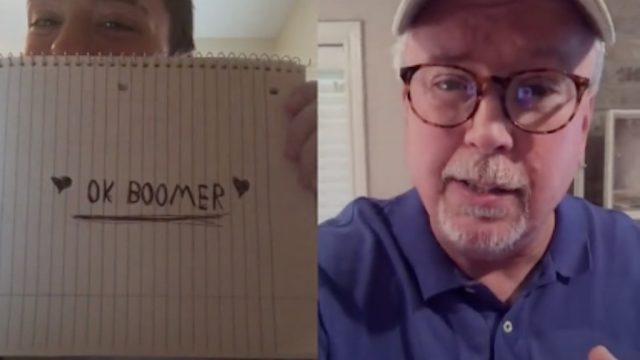Here’s What “OK, Boomer” Means, According to a Media Expert
Of all of the memes of 2019, none have caused as much generational contention as “OK, boomer.” For those wondering what “OK, boomer” means and where the phrase comes from, it’s essentially a dismissive retort from younger generations to show contempt for those over 55. Though the phrase had been kicking around Twitter since April 2018, it took off in October 2019 thanks to a viral TikTok video from user @linzrinzz in which an older white man in a baseball cap and polo shirt delivers a rant that is all-too-familiar to today’s youth.
“The millennials and Generation Z have the Peter Pan syndrome,” the baby boomer says. “They don’t ever want to grow up. They think that the utopian ideals that they have in their youth are somehow going to translate into adulthood.” Then, he continues to tell young ‘uns that they have to “mature” and realize “nothing is free” and that “things aren’t equal.” In response, @linzrinzz holds up a piece of paper that simply reads: “OK, boomer ♥”
Needless to say, it caught on.
Silvia Kratzer, PhD, a visiting associate professor of film, television, and digital media at UCLA, told Best Life that the meme is an indication of how today’s youth fights back. “It is interesting that the ’60s generation fought out their differences with riots and mass social upheavals, whereas present generations opt for more civil disobedience by dismissively poking fun at the older generation,” she said. “Poking fun has become perhaps the most powerful and effective weapon of speaking truth.”
Sure, on the surface, it seems like “OK, boomer” is the equivalent of the kind of “yeah, whatever” response you’d expect from a petulant pre-teen who’s annoyed by the idea that someone might know better than them just because they’re older. And, to some extent, it is. But it’s also more than that.
The phrase expresses the frustration that younger people feel over the fact that many older folks seem dead set on blaming them for the issues facing today’s society. Meanwhile, millennials believe baby boomers are the ones failing to take responsibility for some of the problems that plague Americans currently—the housing shortage, the financial crisis, student debt, climate change, and so on.
“OK, boomer” has continued to gain momentum—and on Sunday, Twitter user @TheGallowBoob’s posted his girlfriend’s explanation that the phrase reflects that millennials have “given up” after years of “using facts and evidence” to explain to baby boomers that millennials “don’t actually have it that easy and they aren’t just lazy.” The tweet has since gone viral.
“OK, boomer” has created a massive wave of contention, particularly with older conservatives, one of whom even compared it to a racial slur.
And that seems to have only galvanized young people into further solidifying its place in pop culture. “OK, boomer” merchandise is selling like hotcakes, and, most recently, 25-year-old New Zealand lawmaker Chlöe Swarbrick used the phrase in response to an older colleague’s heckling over her proposed action items to fight climate change.
Even if you believe that “OK, boomer” is a form of ageism and further proof that kids today don’t respect their elders, it’s hard to deny that the sentiment behind the saying has merit.
“As someone lodged between the baby boomer and the Gen X generation myself, I tend to find these generational labels funny but unhelpful to some extent,” Kratzer says. “But, on a more analytical level, I would side with the millennials in so far as previous generations have burdened them with massive problems, with debt and environmental damage being high on the list.”
